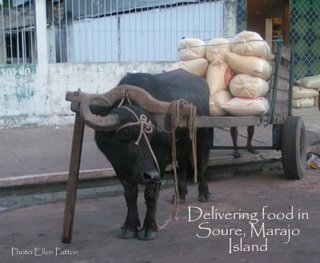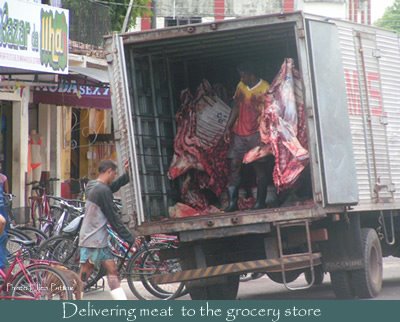Why is there no milk in this list?

Ever wonder what missionaries pay for things? Some of our things are cheaper, others more expensive then in the USA. There are some things you have we just can not get. THere are some we have here, you can not get there.
I tried to convert our prices and quantities to those of the United States. For example all our oil is in 900 mL bottles. Many of our containers are smaller than there. The standard for ketchup is just about 9-10 ounces. Prices can vary quite a bit depending on the quality of the item. Rice for example, can be bought a little cheaper, but the grains will be broken. Availability varies soem also. Frozen vegtables are only available in some groceries, generally only corn, peas and brocoli.cauliflower are available. Sometiems you buy them only to discover they probably have been unthawed and rethawed and are bad.
Cost of food
Rice 33 cents a pound
Brown Rice 90 cents a pound
Beans 40 cents a pound
Sugar 37 cents a pound/1.83 for five
Flour 33 cents a pound/1.63 for five
Oats 1.55 a pound
Coffee 93 cents a pound /3.92 for five
Crackers(like saltines) 83 cents a pound
Oil Soy 1.02 per liter
Oil Canola 2.85 per liter
Laundry Soap 1.46 per pound/7.30 for five
Ketchup 1.68 for 16 ounces
Spaghetti Noodles 58 cents a pound
Tuna 1.55 for 6 ounces/2.07 for 8 oz.
Canned Corn 93 cents for 16 ounces
Frozen Peas 2.55 a pound
Jelly (cheap strawberry)1.42 for 8 ounces/2.84 per pound
Coke 1.45 for 2 liters
Tomato Sauce 1.20 for 16 ounces
Potatoes 3.22 for ten pounds
Carrots 33 cents a pound
Onions 2.10 for five pounds
Eggs 1.37 a dozen
Pineapple 56 cents a piece
Raisins 1.45 for 16 ounces
Brazil Nuts 4.28 per pound
Hamburg 1.20-1.70 per pound
Hot Dogs 1.48 per pound
Filet (as in beef) 3.43 a pound
Bread 93 cents a pound
Fish 1.61-4.30 a pound
Mozzarella cheese 3.45 a pound
Cheddar cheese 5.40 a pound
Margarine 73 cents a pound
Butter 1.30 a pound

A few Other things:
daily newspaper 50 cents or 1 dollar
500 piece puzzle about 20 dollars
4 duracell AA batteries 3.85
21” Television 365 dollars
29” television 670 dollars
Basic CD player with radio 143 dollars
Smallest Microwave-18L 150 dollars
Refrigerator(basic medium) 1142 dollars
Basic washer (clothing) 748 dollars
Gasoline 4.70 per gallon
Why no milk? Because we do not get fresh milk here. All our milk is either dried and we need to mix it up or what they call UHT milk. UHT milk has been specially treated (hence the T) with ultra high heat (hence the UH) to kill all the germs, then sealed in boxes. These boxes do not need to be refrigerated. We buy UHT milk in 1 liter boxes and pay about 2.60 a gallon. Dried milk is similar in cost.



